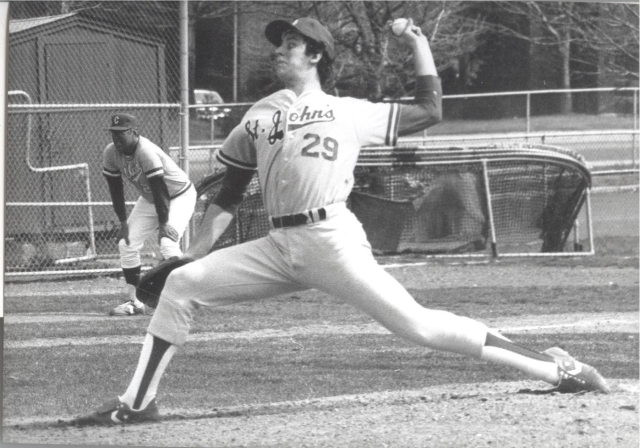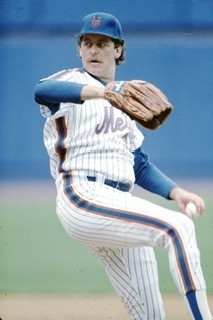
He won Game 7 of the 1987 World Series. He won a Cy Young Award. He was a three-time All-Star.
However, Frank Viola’s favorite baseball memory is of a game he pitched for St. John’s University during the 1981 National Collegiate Athletic Association (NCAA) Northwest Regional Tournament against future New York Mets teammate Ron Darling—often dubbed the “Greatest College Baseball Game Ever Played.” Much of what happened at St. John’s would signal Mr. Viola’s future success, but perhaps none more so than this pivotal game.
“Who would’ve thought I’d go up against Ron Darling [pitching for Yale University], who would become a lifelong friend and achieve something that can never be taken away from us?” he asked. “Plus, we had [famed essayist] Roger Angell there to make the game infamous.”
At 63 years old, Mr. Viola has witnessed and participated in baseball history, but asserts “that was the best game I have ever seen.”
He recently reflected on his stellar career at St. John’s—as well as a 15-year career in Major League Baseball in which he reached heights of which all professionals dream. It includes a World Series ring and a Cy Young Award, given annually to the best pitchers in the American and National Leagues.
A native of East Meadow, NY, Mr. Viola’s father, Frank Sr., was a rabid New York Giants fan whose favorite players were Hall of Famers Mel Ott and Willie Mays. “When they moved to San Francisco, he stayed loyal to them,” Mr. Viola explained. “I was around four or five when the Mets came into existence [in 1962], and he wanted me to have a home team to root for, so we became Mets fans.”
From ages five through 17, Mr. Viola’s father took him to 10 Mets games a season and one New York Yankees game. “That was 10 games to root for the Mets, and one for me to realize there was another New York team,” he laughed. During those years, the Mets, once known as “loveable losers,” became World Champions in 1969 and National League Champions in 1973. “My dad taught me to keep score at a young age, and I liked the game, but 1969 put baseball on a pedestal for me.”
Prior to that time, Mr. Viola was more interested in basketball, and played both sports throughout grammar and high school. During his junior year of high school, he was converted to a pitcher, “and that’s when my career really took off,” he said.
In 1978 Mr. Viola was drafted by the Kansas City Royals, but opted to go to college instead. “I was going to attend either C.W. Post [now LIU Post] or Adelphi,” he said. “I was a late bloomer, and no one seemed interested, but I had good junior and senior years [playing in high school].”
While pitching in a conference title game, Mr. Viola caught the attention of the late Joe Russo, Head Coach of St. John’s Baseball from 1974 to 1990, who offered him a full scholarship to attend St. John’s on the spot.
“Coach Russo promised I’d have an opportunity to pitch, and told me he was bringing in another young kid named John Franco,” another future Major League All-Star who would be a teammate of Mr. Viola’s on the Mets in 1990 and 1991. “The best part is, I probably had a better pitching coach in Howie Gershberg at St. John’s than I would’ve at any lower level in the minor leagues with Kansas City.”
Mr. Viola enjoyed a standout career at St. John’s. “All the stars aligned, and I ended up having three fantastic years at St. John’s, learning from Howie, getting the ball from Coach Russo whenever I was able, and becoming lifelong friends with Johnny Franco,” he said.
The best part of the St. John’s experience, Mr. Viola stressed, were the many friends he made on the team, most of whom are still in his life. He also had high praise for legendary Athletic Director and Head Baseball Coach John “Jack” Kaiser ’49C.
“Coach Kaiser singlehandedly championed my induction into the College Baseball Hall of Fame in 2015,” he recalled. “He was so special.”
Mr. Viola went 26–2 with a 1.67 earned run average in three seasons at St. John’s and led the squad to three-straight NCAA tournaments, including a trip to the 1980 College World Series. However, the game against Yale and Mr. Darling on May 21, 1981, would become legendary.
“We were a cocky bunch, and we didn’t think anybody could beat us,” Mr. Viola explained. “Ronnie was so dominating. We had to wait until the 12th inning to get a base hit.”
Mr. Viola pitched 11 shutout innings himself, giving up no runs with eight strikeouts. “The gods were looking out for us, and we ended up winning,” he said.
That victory increased Mr. Viola’s national profile and he was drafted by the Minnesota Twins in 1981. The team was in a rebuilding phase and Mr. Viola was sent directly to Double A ball, almost unheard of for a player fresh out of college.
Less than a year after being drafted, Mr. Viola was brought up by the Twins. “I got my lunch handed to me during my first year-and-a-half in the big leagues, but [team owner] Calvin Griffith believed in me, and said, ‘Let him learn.’ Before I knew it, everything clicked in 1984.”
That year Twins pitching coach and legendary Brooklyn Dodgers hurler Johnny Podres took Mr. Viola aside and told him to throw every pitch the catcher requested and stay out of his own head. He said, ‘Don’t think. Just throw.’ Eight innings later, I left the game winning 6–2, with no walks and six strikeouts. He said if I trusted my stuff, I’d be an All-Star. I won 18 games that year and never looked back.”
In 1987, Mr. Viola helped lead the Twins to the organization’s first world championship. “We went from losing 100 games, to learning how to win, to believing in ourselves and winning the whole thing.”
Mr. Viola pitched three games of the 1987 World Series, winning Game 7, “which every kid dreams about,” he said. Touched for two runs early in the game, he was in danger of being pulled from the game. Teammate Roy Smalley, with whom Mr. Viola had experienced some friction, pulled him aside and gave him some excellent advice.
“All the hits they got were with my change-up, and Roy noticed they were waiting on that pitch,” Mr. Viola said. “I faced these guys three times in eight days. They knew that was my bread-and-butter pitch. He said I had to switch. I threw 71 pitches the rest of the game, and 68 were fastballs.”
The Twins won the game and the World Series. Mr. Viola was named the Most Valuable Player of the World Series.

After winning the Cy Young Award in 1988, Mr. Viola was traded to his hometown Mets—which he said was a boyhood dream come true. “I got to play with some amazing guys,” he said. “I won 20 games as a Met, and made the All-Star team twice as a Met.”
The year 1991 was off to a great start, but at the All-Star break a tumor formed under the fingernail on the ring finger of his left hand. “I couldn’t grip my change-up,” he said. “I really struggled and the fans weren’t patient—and rightfully so.”
The team collapsed that season, and Mr. Viola signed with the Boston Red Sox the following season, struggling there as well. “In 1994, I blew out my arm, and the strike shortened the season. I had to rehab my arm without baseball.” He later signed with the Cincinnati Reds and the Toronto Blue Jays, before retiring in 1996.
After his career ended, Mr. Viola spent quality time with his family and was offered a coaching position at Lake Highland Preparatory School in Orlando, FL, where his children attended. “I got to see my kids every day and helped them with their baseball program.” Eventually he became Head Coach, and they reached the state finals four times.
In 2009, he was offered a minor league position with the Cleveland Indians (now known as the Guardians). “I was out of the game for 13 years,” he said, and was shocked to realize current players remembered him. “I realized then and there I could make a difference.”
The following year he was offered a minor league coaching position with the Mets and spent the next eight years with the organization. “I really thought I could be a big-league pitching coach, but it never came to fruition,” he said. “The Mets got into analytics and went in a different direction, but it was a great experience.”
While Mr. Viola believes there is a benefit to analytics, it has changed the game so much he rarely watches a big-league contest. “You need to get the old-school guys back to help the game. You have to have a mix, or the game will never be what it used to be.”
After moving to North Carolina, Mr. Viola was offered the position of pitching coach for the High Point Rockers of the Atlantic Baseball League. “I’ve done that ever since, and love what I’m doing in independent ball,” he said.
Mr. Viola is especially proud of helping several pitchers reach the major leagues. “We’re giving these kids a chance to continue living their dreams.”
Coaching has been a profound experience for Mr. Viola. “Everything I lived and experienced in the game, and learning how to humble myself, made me a better pitcher and a better person,” he reflected. “I realized I could make a difference to others. I’m just Frank. It’s nice to be one of the guys.”
He continued, “You have that little window when they realize who you were, and when you say something, they listen. What I love about coaching is the mental part of the game. I know how difficult it is day to day. Knowing that somebody has their back at all times means a lot. What was thrilling for me as a player was knowing that somebody was working with me and caring for me. I want to be that guy.”
Related News
Construction of Red Storm Basketball Practice Facility Begins
On a crisp February morning as the sun rose over St. John’s University, the first signs of transformation settled over the Queens, NY, campus. Behind the construction fencing erected last semester, the steady hum of heavy machinery echoed across a barren parking lot. After years of planning, approvals, and design tweaks, the construction of the new Red Storm basketball practice facility had officially begun.
Archbishop Hicks Attends St. John’s University Men’s Basketball Game at Madison Square Garden
St. John’s University proudly welcomed the Most Reverend Archbishop Ronald A. Hicks to Madison Square Garden on Monday, February 9, 2026, as he attended the Red Storm Men’s Basketball game in a show of support for the University community, its student-athletes, and its Catholic and Vincentian mission.
St. John’s Breaks Ground on New Basketball Facility and Recreational Upgrades
Construction will soon begin on a new basketball practice facility on St. John’s University’s Queens, NY, campus that serves as the first step in the renovation and modernization of student recreational resources.
